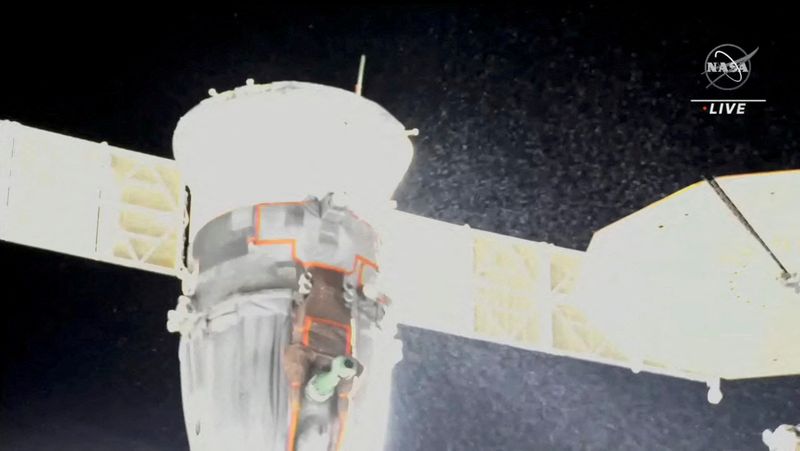By Joey Roulette
WASHINGTON (Reuters) -Russia's space agency said it is considering a "rescue" plan to send an empty spacecraft to the International Space Station (ISS) to bring home three crew members ahead of schedule, after their Soyuz capsule sprang a coolant leak while docked to the orbiting outpost.
Roscosmos and NASA officials said at a news conference on Thursday they continue to investigate how the coolant line of the capsule's external radiator sustained a tiny puncture last week, just as two cosmonauts were preparing for a routine spacewalk.
No final decision has been made about the precise means of flying the capsule's three crew members back to Earth - whether by launching another Soyuz to retrieve them or by the seemingly less likely option of sending them home in the leaky capsule without most of its coolant.
Last week, Sergei Krikalev, Russia's chief of crewed space programs, said the leak could have been caused by a micrometeoroid strike. But he and his NASA counterparts have left open the possibility of other culprits, such as a hardware failure or an impact by a tiny piece of space debris.
The Dec. 14 leak prompted mission controllers in Moscow to call off the spacewalk as a live NASA webcast showed what appeared to be a flurry of snowflake-like particles spewing from the rear of the Soyuz spacecraft.
The leak lasted for hours and emptied the radiator of coolant used to regulate temperatures inside the crew compartment of the spacecraft.
NASA has said that none of the ISS crew was ever in any danger from the leak.
Cosmonauts Sergey Prokopyev and Dimitri Petelin, who were suited up for the spacewalk at the time, flew to the ISS aboard the now-crippled Soyuz MS-22 capsule along with U.S. astronaut Frank Rubio in September.
They were originally due to fly back home on the same spacecraft in March, but Krikalev and NASA's ISS program manager, Joel Montalbano, said Roscosmos would return them to Earth two or three weeks early if Russian space officials decide to launch an empty crew capsule for their retrieval.
Four other ISS crew members - two more from NASA, a third Russian cosmonaut and a Japanese astronaut - rode to the ISS in October via a NASA-contracted SpaceX Crew Dragon and they also remain aboard, with their capsule parked at the station.
METEOR SHOWER?
The leak has upended Russia's ISS routines for the weeks ahead, forcing a suspension of all future Roscosmos spacewalks as officials in Moscow shift their focus to the leaky MS-22, a designated lifeboat for its three crew members if something goes wrong aboard the space station.
Two U.S. astronauts, Rubio and Josh Cassada, conducted a seven-hour spacewalk without incident on Thursday to install a new roll-out solar array outside the station, NASA said.
If MS-22 is deemed unsafe to carry crew members back to Earth, another Soyuz capsule in line to ferry Russia's next crew to the station in March would instead "be sent up unmanned to have (a) healthy vehicle on board the station to be able to rescue crew," Krikalev, Roscosmos' executive director for human spaceflight, told reporters.
No mention was made of possibly sending a spare SpaceX Dragon for crew retrieval.
Pinpointing the cause of the leak could factor into decisions about the best way to return crew members.
The recent Geminid meteor shower initially seemed to raise the odds of a micrometeoroid strike as the origin, but the leak was facing the wrong way for that to be the case, Montalbano said, though a space rock could have come from another direction.
Sending the stricken MS-22 back to Earth unfixed with humans aboard appeared an unlikely choice given the vital role the coolant system plays to prevent overheating of the capsule's crew compartment, which Montalbano and Krikalev said was currently being vented with air flow allowed through an open hatch to the ISS.

NASA has previously said the capsule's temperatures remain "within acceptable limits" and that a recent test of the capsule's thrusters was performed without a hitch. But Krikalev added that the temperature would rise rapidly if the hatch to the station were closed.
The ISS, a science laboratory spanning the length of a football field, orbits about 250 miles (400 km) above the Earth and has been continuously occupied for two decades, managed by a U.S.-Russian-led partnership that also includes Canada, Japan and 11 European countries.